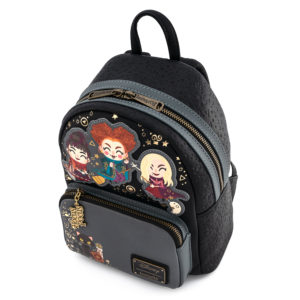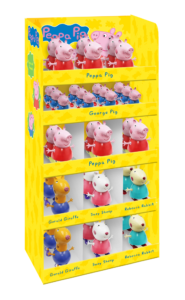While it’s true enough that the world’s pandemic crisis saw some of the biggest forms of live entertainment hit the pause button for the best part of the year, the likes of Disney’s portfolio of theme parks that draw all manner of pop culture enthusiasts year on year, the desire among fans to buy into their favourite brands hasn’t been diminished.
At Loungefly, the lifestyle and gifting division of the pop culture specialist, Funko, 2020 has seen sales ‘go through the roof.’ The business has told Licensing.biz that it has seen a massive surge in numbers of sales, amid a 25 per cent global growth of its branded products portfolio, proof that the pandemic hasn’t dampened the world’s culture of fandom.
Global sales at Loungefly are now estimated to generate up to $100,000,000 by 2021, while Truffle Shuffle, one of the company’s key retailers in the lifestyle space, has confirmed that it now manages to sell somewhere between 2,000 to 3,000 Loungefly bags per month on average.

Head of softlines, Funko EMEA, Rich Smith
“Sales this year have been incredible, and growth has exceeded expectations, with all things considered,” Rich Smith, head of softlines, Funko EMEA, told Licensing.biz. “We have seen huge success behind some of the Disney properties which are not as mainstream, such as Peter Pan, Lady and the Tramp, and Pixar’s Wall:E. Our evergreen properties such as Mickey, Star Wars, and Disney Princess have also continued to serve us well too.”
It’s according to Smith that demand in the pop culture lifestyle space this year has, in part, been fuelled by an unsatisfied itch among the fandom space; one that has been exacerbated by the closure of events and destinations like theme parks or conventions throughout the year. As a result, the scene’s audience of fans have taken to engaging with their favourite brands via other means.
“Due to Covid-19 restrictions, the gigantic fanbase who normally save up and visit the Disney Parks haven’t been able to and have therefore spent the money they would normally spend at the parks on product from retailers across Europe and Loungefly,” said Smith.
“Loungefly opens Funko up to a different customer base and vice versa for Loungefly. So many of the fans are wanting to get more product that ties into their collections. The beauty of the Funko umbrella is that you can buy a Marvel backpack, a Marvel t-shirt, a Marvel mug, a Marvel keyring, a Marvel advent calendar, and so forth, all under one roof, with consistent imagery: the perfect collection.”
Among the best-selling items within the Loungefly portfolio this year, it has been the mini backpack range that has stood out as its leading line. Across this range – and akin to its collectables business – Funko’s Loungefly works with a broad licensing portfolio that spans the likes of Disney, Marvel, Star Wars, Harry Potter, Warner Bros, DC, SpongeBob SquarePants, Hello Kitty, Pusheen, MTV, Clueless, and beyond.

“Loungefly is unique as we are a brand who collaborates with some of the world’s most loved licenses,” continued Smith. “We will continue to grow our offering and will continue to add more licenses to our already strong portfolio. We like to look for a license with an impeccable following, and who fits within our brand goals. They also, of course, need to appeal to our fanbase, who we listen to – a lot.”
Like the rest of the waking world, this year has seen Loungefly witness its biggest consumer trend within the online shopping space, and currently boasts a network of retailers 90 per cent made up of purely online players.
“To build on this from here, we will continue to push growth across the EMEA region with some key retail partners, as well as continue to expand our offering on our very own online store,” said Smith.
“Look out for a ton of new exclusives in 2021.”












